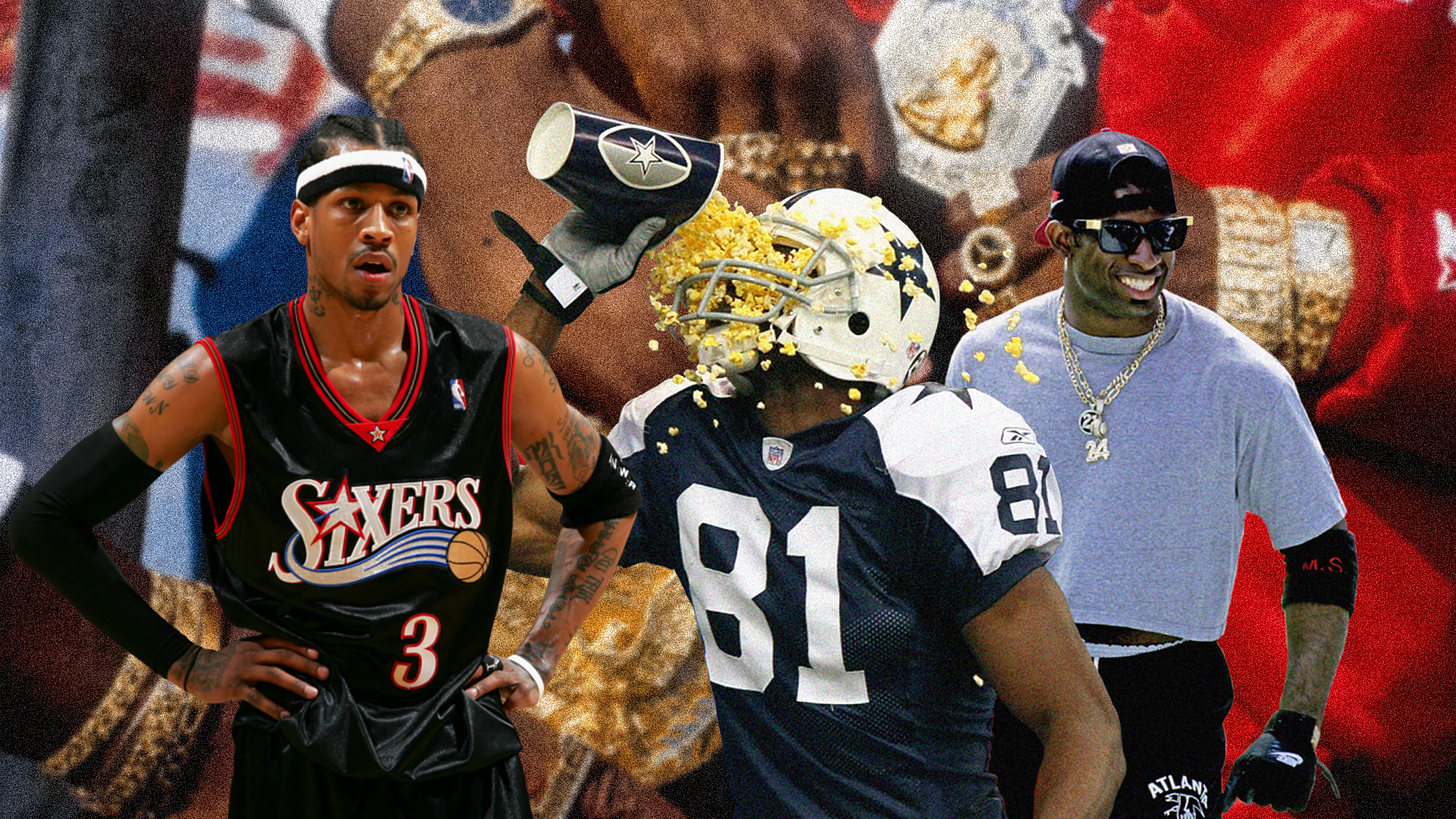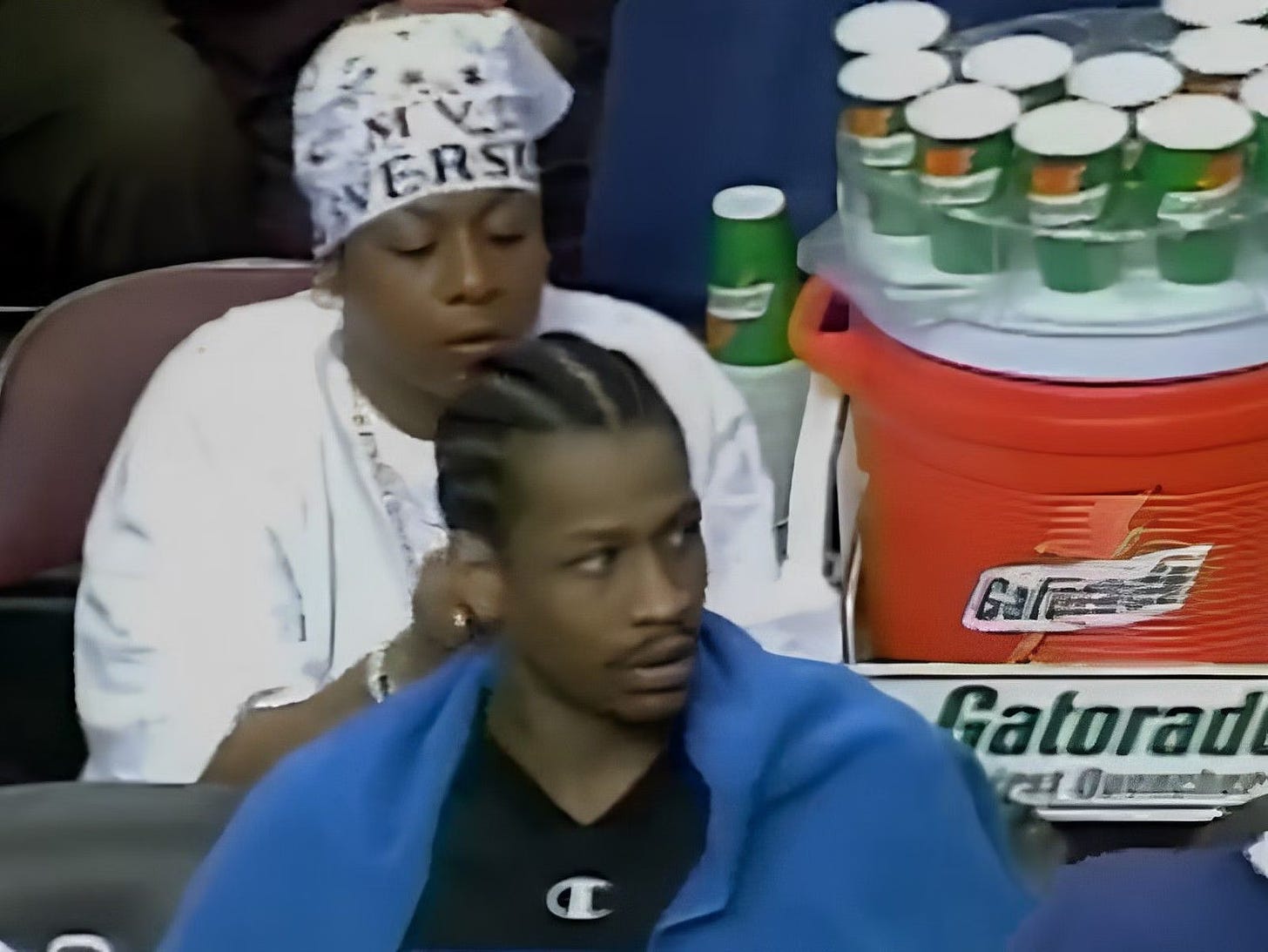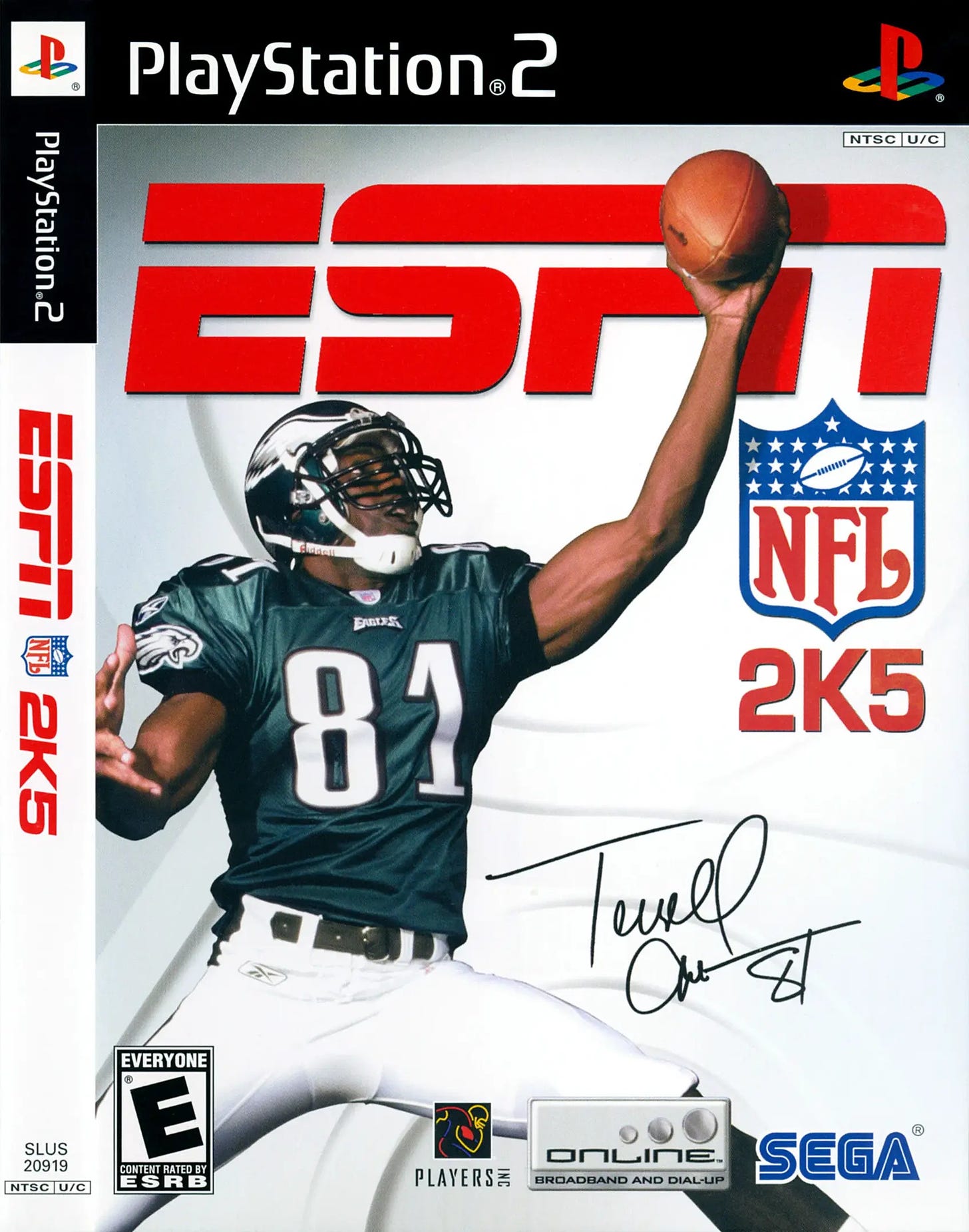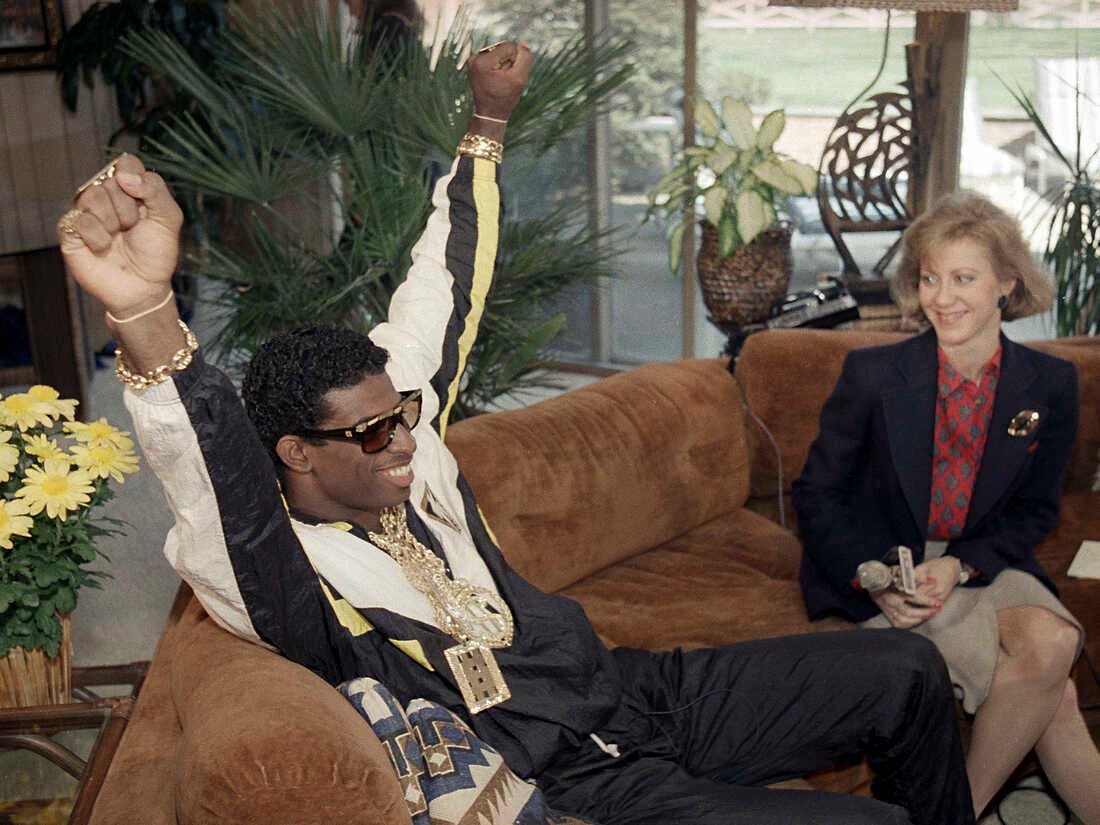Enjoy an audio reading of this essay, or scroll to keep reading.
“You’re cocky,” said my crush. I was in ninth grade. Not only that, but I was one of the only Black people in my class. I had come to the school for a better shot at playing high school sports and wasn’t quiet about how good I thought I was. From the court to the classroom and everywhere in between, I wanted you to know I was nice with it.
I think they call it a crush because of their capacity to crush you, to say the thing that will leave you gasping for air. She called me on my arrogance, and I wanted to hide or fight—whichever came first. I heard it as a negative. But I wonder if I should have. My favorite athletes growing up were outspoken Black men who talked their shit and backed it up. They knew how good they were and didn’t hide it. They also proudly wore their expressions of Blackness.
I remember sitting on the computer in Grandma Gwen’s classroom and searching for images of Allen Iverson. He is my all-time favorite basketball player. A six-foot point guard with hundreds of tattoos who wore cornrows, baggy clothes, and expensive chains. He reflected his home community of Newport News, Virginia, more than he attempted to look like Michael Jordan and other veteran players that came before him.
While A.I. was the same player that stepped over Tyronn Lue after hitting a fadeaway against the Lakers in the 2001 NBA Finals, he was also the player that let his aunt tenderly braid his hair mid-game. The NBA vilified A.I.’s look and changed the dress code because of him, making players wear “business casual attire” on game days. But that didn’t impact how I saw Iverson. He’s still my epitome of cool.
Iverson told GQ: “I think what grabbed the culture was the fact that here he is, a mega-superstar and rich, and he dressed just like us, and people had never seen that before.” I didn’t want to be like Mike; I wanted to be like A.I. The rappers I grew up seeing on TV also wanted to be like him, especially Lil’ Bow Wow. He had the braids. The throwback jerseys. I loved it. Even in the opening scene of Like Mike, Bow Wow is wearing an Iverson jersey.
I never looked at A.I. as cocky; he was inspiring. An example of being yourself and defying the odds even if it meant crashing into the two-headed monster of Shaquille O'Neal & Kobe Bryant.
Four minutes around the corner from Iverson’s home arena in Philadelphia, Terrell Owens became the new spectacle in town when he signed with the Eagles in 2004. Pictured on the cover of ESPN NFL 2K5, a short-lived Madden competitor, T.O. became my favorite athlete to play with and most enjoyable player to watch.
“Get your popcorn ready,” proclaimed T.O. And quite literally, when he became a Dallas Cowboy, one of his touchdown celebrations was pouring a bucket of popcorn into his helmet. Mostly, I loved T.O. for his endzone antics. Before joining the Eagles, Owens made a name for himself with touchdown celebrations like pulling a Sharpie out of his sock and signing the football. Also, at one point, he grabbed a pair of pom-poms and danced with the cheer team.
T.O. was a showman, and I excitedly looked forward to what he would do next. When the Eagles played the Baltimore Ravens during his first season with the team, Owens caught a touchdown pass and mimicked the entrance dance of Ravens all-pro linebacker Ray Lewis. T.O. executed it flawlessly and upset Lewis in the process. But how mad could you be when it's clear he was having so much fun with it?
Rooting for the Eagles during Owens’ tenure, I was lucky to see them go the Super Bowl in 2004. T.O. returned to the Eagles during that game after breaking his leg and tearing a ligament in his right ankle seven weeks prior. Although Owens was never going to be cleared to play in the Super Bowl, he went on to play 62 of 72 snaps during the game and caught nine passes for 122 yards on 14 targets. I was heartbroken when the Eagles lost, but you couldn’t say T.O. was only in it for himself. He risked his career to give his team a chance at a championship.
Attempting to persuade voters to select Owens for the Pro Football Hall of Fame, writer Jarrett Bell, in what he thought was an honest portrayal, acknowledged T.O. as epitomizing the “diva receiver.” While players such as Randy Moss, Michael Irvin, and Keyshawn Johnson also demanded targets and great attention, Owens seemed more misunderstood than most. His outspokenness undeniably made people uncomfortable in a sport where Black athletes who step out of line find themselves on the outside looking in.
Owens went on to play five more seasons after a dramatic departure from the Eagles. While he put up solid numbers with three other teams, including a final season opposite Chad Ochocinco, another receiver known for his touchdown celebrations, the Cincinnati Bengals decided not to re-sign T.O. Although he got one more chance with the Seattle Seahawks during the offseason of the 2012-13 season, Owens’ NFL career was effectively done after that last stint with the Bengals.
I didn’t really keep up with T.O. after he left the Eagles. But recently, I've started seeing him on the sidelines with Deion Sanders’ Colorado Buffaloes—a team that's been the biggest story in college football this year. It makes sense that Coach Prime has tapped Owens to spend time with his team. During Sanders’ 14-year NFL career, which included nine seasons in Major League Baseball, he was recognized as one of the greatest and most misunderstood athletes in all sports.
Paving the way for T.O. in football and Iverson in basketball, Sanders was also known for being a "diva." He was criticized for caring more about flash than winning. When the Atlanta Falcons selected Prime fifth overall in the 1989 NFL Draft, he took the call in gold-plated sunglasses, a black, white, and gold tracksuit, and piles of gold chains. “It’s gonna be a lot of zeroes in that contract,” he said about signing with the Falcons. “You gonna think it’s alphabet soup or something, all those zeroes in there.”
Deion Sanders stayed with the drip. And he also made sure you saw him on the playing field. Running back an interception, well ahead of the opposing offense, Prime would hold the back of his helmet and stride forward. Once he reached the endzone, he’d hit his signature “Primetime Shuffle.” I remember watching him do this at 37 as a member of the Ravens during his second-to-last NFL season. At the time, I didn’t know this would be the final touchdown and pick-six of Sanders’ storied career.
In recent years, Deion Sanders has received outsized attention as Coach Prime—most notably for Jackson State University from 2020-22 and currently for the University of Colorado Boulder. Coach Prime made waves when his departure from Jackson State was reported ahead of the HBCU’s Celebration Bowl loss. Those waves continued as he started at Colorado and announced plans to overhaul the team’s roster.
The Buffs finished 1-11 the season before Sanders joined. With his hiring, Colorado gained 86 new players—nine of which played for Coach Prime at Jackson State, including Sanders’ son Shedeur and Travis Hunter, the highest-ranked recruit to commit to an HBCU. Coach Prime’s rallying cry for Colorado as they entered this season was “WE COMING,” which evolved to “WE HERE” after upsetting TCU, last year’s national runner-up, in the Buffs’ season opener.
Sanders speaks with the cadence of a Black preacher while still sporting his signature shades and gold jewelry—now with a gold whistle on a chain to match. “We’re gonna continue to be questioned because we do things that have never been done,” declared Coach Prime during his press conference after beating TCU. “When you see a confident Black man sitting up there talking his talk, walking his walk… that’s kinda threatening. Oh, they don’t like that! But guess what. We gonna consistently do what we do because I’m here and ain’t going nowhere. And I’m ‘bout to get comfortable in a minute.”
As Black people, we’re not new to our confidence being mistaken for arrogance. Frankly, it ain’t stopping us either. In Coco Gauff's words after becoming a U.S. Open Champion at 19 years old: “Those who thought you were putting water on my fire were really adding gas to it, and now I’m really burning so bright.”
Terrell Owens didn’t start doing touchdown celebrations because he thought they were entertaining; he did them so his mom could see him on the field and know it was him.
When Colorado State’s coach took a shot at Deion Sanders ahead of their Colorado rivalry game, implying Sanders’ mom didn’t teach him he should take his hat and glasses off when talking to grown-ups, Coach Prime brought his mom to hype up the Buffs before their 43-35 double-overtime victory over the Rams.
“I raised him right,” said Connie into the mic. “I also told him to always be yourself. If you have to kick ass, kick ass!”
Allen Iverson was criticized for bringing the hood with him—only for Coach Prime to thank “all the hood that had my back” on live TV after his first Colorado win.
A.I., T.O., and Primetime were magnetic for me because they brought us with them—and by us, I mean their people. Black people. And lots of different expressions of Blackness at that. Their communication wasn’t merely flashy; it was communal. We could see ourselves in the way they spoke and carried themselves. And even when they were defeated or took a wrong step, they were still ours. They shined for us and made constellations in our own likeness.
These days, cockiness is the least of my concerns. Because those who call it out consistently prove they don’t know what it means.
The Ringer’s Rodger Sherman offered a more peaceful existence when writing about the atmosphere Coach Prime helped bring to Jackson State: “Appreciate how it looks, how it feels, and how it means so much to so many.”
This is a love letter to those who taught me to love.
Are you not entertained?








Beautiful, Alex! Definitely makes me reflect on the rollercoaster of emotions I felt about Angel Reese in that championship game, witnessing confidence definitely makes people feel big feelings! It also makes me think about the interesting contrast of super big bravado + the "all glory to god" kind of humbleness we see so much in sports especially. Thanks for sharing your perspective, as always
This was great! I’m late to it, but it was an on-time read. There’s something about authenticity that builds community and a sense of belonging. I think that’s apart of the backlash too - the bringing along.